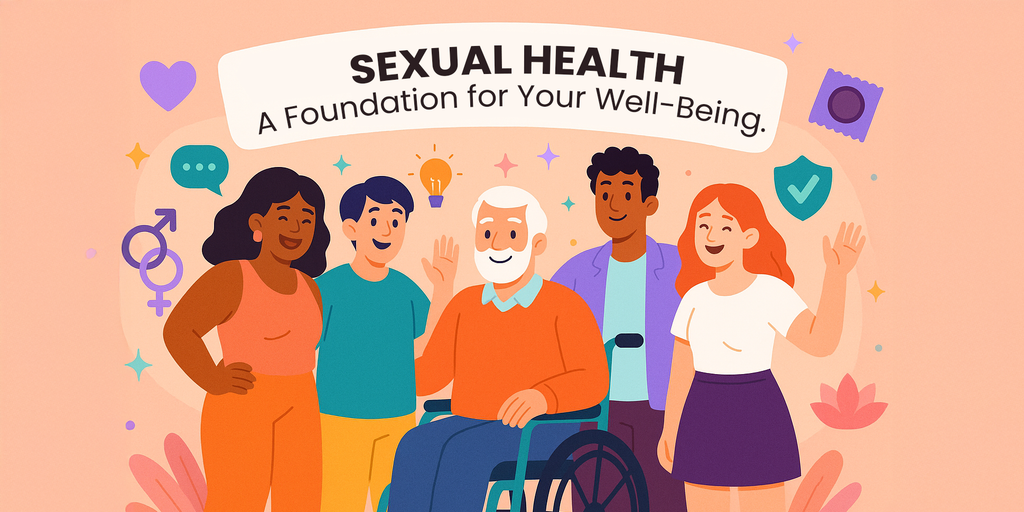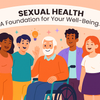What Is Sexual Health? A Foundation for Your Well-Being

Sexual health is not just about avoiding disease or unwanted outcomes. It’s about the positive, respectful, and empowering experiences we have with our bodies and with others. When sexual health is supported, it allows us to express ourselves confidently, make informed choices, and experience intimacy on our own terms. This means without fear, shame, or pressure.
Let’s break down what it really means to be sexually healthy.
Jump to a section:
Sexual Health Is More Than the Absence of STIs
A lot of people hear “sexual health” and immediately think of STI tests, condoms, or birth control. While these tools are essential for prevention and safety, they only scratch the surface of what true sexual wellness means.
Sexual health is not just about avoiding disease, it’s also about feeling good in your body, your decisions, and your relationships. It's the freedom to explore your sexuality without fear, judgment, or harm, and the confidence to communicate your needs and boundaries. It's a state of physical, mental, and emotional well-being related to sexuality, not just the absence of illness or dysfunction.
Here are a few critical dimensions of sexual wellness that go beyond prevention:
Feeling Safe in Your Body and Your Choices
Sexual health means being able to express your sexuality in a way that feels right for you. That includes having autonomy over your body, feeling secure in the choices you make, and knowing that your boundaries are respected. You should never feel obligated, afraid, or unsure about asserting what you want or don’t want.
Freedom from Coercion, Pressure, or Violence
Sexual experiences should never come with force, guilt-tripping, manipulation, or fear. Healthy sexual wellness includes the right to say no, the right to change your mind, and the right to be free from any form of exploitation, whether physical, emotional, or digital.
Access to Accurate Information, Resources, and Support
Being sexually healthy means having the tools and knowledge to make informed decisions. That includes access to quality sexual education, health services, support for gender or sexual identity, and professionals who treat you with respect and inclusivity, no matter who you are or who you love.
Enjoying Sex Without Pain, Anxiety, or Shame
Sex should feel good, not something you fear or dread. For many people, pain during sex, shame around desire, or anxiety from past experiences can get in the way. Sexual wellness includes the right to seek help and support so you can experience pleasure and connection, not discomfort or guilt.
Exploring Pleasure in a Way That Aligns With Your Values
Every person is different and so is what turns them on, makes them feel close to someone, or feels meaningful in a sexual experience. True wellness allows space to explore what consensual, affirming pleasure looks like for you. Whether you're solo or with a partner, your sexuality should reflect your own identity, preferences, and comfort level.
Physical, Emotional, and Mental Aspects
Sexual wellness is never just about one thing, it's a balance of multiple, deeply connected layers. When we talk about sexual health, we’re not just referring to STI screenings or physical symptoms. We're talking about how you feel in your body, how you connect with others, and how you process your experiences internally. All of it matters.
Let’s break down each aspect:
Physical Aspects of Sexual Health
This is what most people think of first but even the physical component is broader than many realize.
-
Reproductive Health: Includes healthy menstruation, fertility, hormonal balance, and pregnancy (if desired).
-
Pain-Free Pleasure: Sex should not hurt. Discomfort may signal underlying issues like vaginismus, endometriosis, erectile dysfunction, or infections — all treatable with proper care.
-
Functioning Body Systems: Your nervous, circulatory, and muscular systems all play a role in arousal and satisfaction.
-
Prevention & Protection: Includes STI testing, vaccinations (like HPV), contraception, and barrier methods.
-
Body Comfort: Feeling physically at home in your body, whether you're exploring solo or with a partner, is key to intimacy and self-expression.
Emotional Aspects of Sexual Health
Your emotional well-being plays a massive role in your ability to enjoy sex and connection. This includes:
-
Safety and Trust: Sex should happen in an environment where you feel physically and emotionally secure.
-
Confidence: Feeling empowered to express your needs, ask for what you want, and say no when necessary.
-
Intimacy and Connection: Whether it’s romantic, platonic, or sexual, intimacy is about vulnerability and closeness.
-
Boundaries: Knowing your limits, and respecting others', is a sign of emotional maturity and health.
-
Communication: Emotional health includes the ability to talk openly with partners about sex, desires, fears, and expectations.
Without emotional safety, even physically pleasurable experiences can become stressful or harmful.
Mental Aspects of Sexual Health
This is often the most overlooked dimension but it deeply impacts how we view ourselves and our sexual experiences.
-
Shame & Stigma: Many people carry internalized shame from cultural, religious, or societal messages about sex. Unlearning that is part of healing.
-
Sexual Identity & Orientation: Exploring and understanding who you're attracted to, how you define your gender, or how you feel about your body can be confusing, but it's also liberating.
-
Desire & Arousal: Understanding what turns you on, when and why, is part of learning your unique sexual blueprint.
-
Mental Health Disorders: Depression, anxiety, PTSD, or body dysmorphia can directly affect libido, arousal, and satisfaction.
-
Past Trauma: Unresolved trauma, including childhood experiences or sexual assault, can linger in the mind and body, affecting intimacy and pleasure. Healing is possible, but it requires support.
How These Aspects Work Together
These areas don’t operate in silos, they’re deeply interconnected. For example:
-
Chronic pain (physical) can lead to sexual avoidance (emotional) and loss of confidence or identity confusion (mental).
-
Anxiety (mental) can make it harder to relax and become aroused (physical), which may affect emotional intimacy with a partner.
-
A lack of safe communication (emotional) might prevent someone from advocating for birth control or condoms (physical), which can lead to risky outcomes that increase stress (mental).
Sexual wellness is whole-person wellness. When one area suffers, the others often feel it too, but when you begin nurturing each area, healing and empowerment follow.
Sexual Health Across the Lifespan
Sexual health is not static, it evolves with you. From the time you're discovering your body in adolescence, to navigating your desires in adulthood, to redefining intimacy later in life, your needs, experiences, and boundaries all shift over time. And that’s not only normal, it’s healthy.
Being sexually healthy at any age means embracing the changes, asking questions, staying informed, and allowing yourself to grow without shame. Below is a deeper look at how sexual health transforms across different life stages and experiences.
Young Adulthood (Teens to 30s)
-
Self-Discovery: This phase is often about learning what you like, how you like it, and with whom. It's where consent, communication, and experimentation begin to form a foundation for future intimacy.
-
Contraception & STI Prevention: Many are navigating pregnancy prevention, STI screenings, and learning about their reproductive options for the first time.
-
Body Confidence & Identity: Young adults may begin exploring their gender identity or sexual orientation, sometimes privately, sometimes publicly.
-
Cultural Pressure: Unrealistic expectations from media and peers can create performance anxiety or body insecurities.
🔑 Tip: It's okay not to have everything figured out. Your early sexual experiences are not a final draft, they’re part of your personal growth.
Midlife Shifts (30s to 50s)
-
Parenthood & Partnership: Intimacy may shift after having children, with many navigating fatigue, changing bodies, and less time for themselves.
-
Sex After Childbirth or Surgery: Healing and rediscovering pleasure can take time, physically and emotionally.
-
Hormonal Fluctuations: These can affect libido, vaginal lubrication, erectile function, and mood.
-
Reevaluating Desires: Many people in this stage revisit their wants, boundaries, or identities — including exploring kink, non-monogamy, or same-sex attraction.
🔑 Tip: This is a powerful time for self-reflection. Many find that as they age, they gain more confidence in their preferences and boundaries.
Later Years (60+)
-
Menopause & Andropause: These bring hormonal shifts that can influence sexual desire and comfort.
-
Sexual Redefinition: Intimacy may become more about emotional closeness, sensual touch, or mutual care but that doesn’t mean it's less important or enjoyable.
-
Body Changes: Aging bodies might need different kinds of stimulation or support (e.g., lubricants, ED treatments), but desire doesn’t disappear with age.
-
Loss, Grief & New Beginnings: Some people are navigating widowhood, divorce, or new relationships later in life.
🔑 Tip: You’re never “too old” to enjoy sex or connection. Sexuality is ageless and the right to feel pleasure, be touched, and explore never expires.
Life Transitions & Individual Journeys
Sexual health can also shift based on life events, regardless of age. Some examples include:
-
Navigating sex after trauma: Healing from past abuse or violence is deeply personal and often requires professional support. It may involve reclaiming bodily autonomy and learning to trust again.
-
Exploring gender or orientation: Coming out or transitioning, at any age, brings emotional, mental, and sometimes physical adjustments that deserve compassion and support.
-
Sex after medical intervention: Surgeries, chronic illness, or disabilities may require new approaches to intimacy. Adaptive tools, communication, and open-minded partners make a huge difference.
-
Relationship Shifts: From long-term partnerships to dating again after a breakup or divorce, sexual confidence may need rebuilding.
The Bottom Line
Being sexually healthy isn’t about having all the answers or a perfect sex life. It’s about staying:
-
Curious about your own needs and experiences
-
Informed about your body, options, and rights
-
Supported by professionals, partners, or communities that affirm your journey
Your sexuality belongs to you and it's allowed to evolve. No matter your age, gender, relationship status, or history, you have the right to feel pleasure, explore your desires, and define what sexual well-being means to you.
Everyone Deserves Access to Sexual Wellness
Sexual wellness is more than a luxury, it’s a human right. And yet, for generations, conversations about sex, intimacy, and pleasure have been wrapped in shame, silence, and stigma. It’s time for that to change.
At its core, sexual wellness is about agency, education, and affirmation. It’s about every individual, regardless of their background, identity, or experience, having the opportunity to explore, understand, and embrace their sexual self safely and confidently.
Inclusive, Affirming, and Accessible for All
Sexual wellness belongs to everyone, including but not limited to:
-
Women, men, and nonbinary individuals
-
LGBTQIA+ and questioning folks
-
People of all races, cultures, and religious backgrounds
-
Disabled and Neurodivergent people
-
Survivors of trauma or violence
-
People who are celibate, asexual, or sex-repulsed
-
Sex workers, kink communities, and those outside the mainstream
There is no one way to experience sexuality. What matters is that people have access to the resources and support they need to make choices that feel right for them without fear, shame, or judgment.
What Everyone Deserves
Here’s what true access to sexual wellness looks like:
✅ Affirming Care & Education
Sex education should be inclusive, science-based, and affirm people of all identities. That means going beyond outdated scare tactics and binary definitions, and instead offering real tools for navigating consent, pleasure, anatomy, boundaries, and emotional safety.
✅ Safe Spaces to Explore
Whether it’s a physical clinic, an online store, or articles like this one, people need spaces that respect their curiosity, their questions, and their vulnerability. This includes representation in imagery, language, and product recommendations.
✅ Empowered Choices
Everyone deserves the ability to choose what’s best for their body and their relationships. That includes access to contraception, STI testing, lubricants, toys, gender-affirming products, and helpful information, without being shamed or judged.
✅ Respect in Every Interaction
Sexual wellness is also about dignity. Respect means honoring a person’s identity, their “yes,” their “no,” and everything in between. It means partners (and providers) listening without assumptions or pressure.
Replacing Fear & Shame With Respect & Empowerment
For too long, sexual health has been approached from a place of fear. We're told what not to do, what to be afraid of, and who not to become. Shame was the default — especially for women, queer folks, and anyone whose experience didn’t fit neatly into a box.
This resource page exists to offer something different.
It’s not here to scare you, limit you, or lecture you. It’s here to:
-
Help you feel seen and understood
-
Offer tools for pleasure and safety
-
Celebrate diversity in desire
-
Encourage curiosity without judgment
You are allowed to seek joy. You’re allowed to have questions. You’re allowed to prioritize your sexual well-being, whether that means exploring new things, healing old wounds, or simply learning more about your body.
Sexual wellness is not reserved for the few. It’s for you, exactly as you are.





